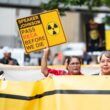The world needs a strong global nuclear economy
By Stephen M. Goldberg, September 9, 2008
Global population growth in combination with further industrial development will lead to a doubling of worldwide electricity consumption by 2030, according to the World Nuclear Association. Add an increasing shortage of fresh water and the increasing need for energy-intensive desalination plants, and nuclear energy offers significant opportunities to meet growing energy demands of a developing world. Because of this and other reasons, an expanding set of non-nuclear countries are considering deploying new nuclear power plants.
Nuclear energy also enjoys a unique position in the climate debate. It’s the only carbon-free energy source that’s already contributing to energy supplies on a relatively large scale and is also expandable without requiring major technological breakthroughs. In addition, it offers a hedge against the vulnerability of interrupted deliveries of fossil fuels. This is a key issue in regions such as Eastern Europe, which is subject to the whims of Russia and other supplier states.
A recent MIT study on the future of nuclear power indicated that to be a substantial mitigation measure against future climate disruptions, nuclear energy would need to expand 1,000-1,500 gigawatts by the middle of the twenty-first century–a tripling or quadrupling of current nuclear capacity. At the same time, government incentives to reduce carbon emissions and institute carbon-trading schemes will increase the economic competitiveness of nuclear power versus other electricity sources.
It should be noted that a robust nuclear fuel supply and disposition economy will need to be provided to these emerging nuclear energy countries. Such a regime must also reduce the incentive for countries to develop new nuclear enrichment and/or reprocessing capabilities, potential sources of proliferation of nuclear materials for weapons.
International fuel schemes are being proposed that would provide fuel to nuclear consumer nations and provide for its return. Representatives of the nuclear industry, along with Argonne National Laboratory, developed a novel concept entitled TRUST, or Terms for Reliable Uranium Service Transactions through leasing. The program would provide for fuel supply and used fuel management in a global marketplace. A guiding principle of TRUST is its reliance on existing market structures such as commercial arrangements that have been successful in the United States and other countries with substantial nuclear power programs. The term of the lease would be limited to the assembly of the fuel components and services, use of the fuel, and storage of the spent fuel at facilities owned by the nuclear utility. The lease would end when, and if, the spent fuel is removed from the site.
This arrangement has significant benefits–including providing small buyers with a lowered cost and reduced risk of interruptions due to a diversity of uranium supply, through economies of scale. Beyond just decreasing cost, the program would also decrease the risk of proliferation by allowing the lessor to maintain legal title to the fuel, ensuring the return of spent fuel on a schedule and on commercial terms (rather than a direct sale, which is more final) to be specified in the lease agreement. This is similar to current leases for industrial equipment, which typically require the lessee to comply with all laws and regulations governing use of the equipment. A lease for the provision of nuclear fuel to an emerging nuclear energy country should require that the utility comply with all applicable laws, conventions, and agreements concerning possession and use of that fuel, including International Atomic Energy Agency Safeguard Agreements.
We have learned a secure and defined disposition path for the used fuel is the critical implementation step to execute TRUST. As such, the goals of the Global Nuclear Energy Partnership would support such a requirement by having countries with secure, advanced nuclear capabilities provide fuel services–fresh fuel and recovery of used fuel–to nuclear consumer nations.
Topics: Nuclear Energy
Share: [addthis tool="addthis_inline_share_toolbox"]














